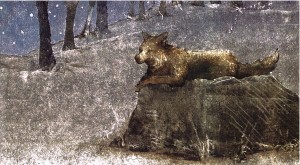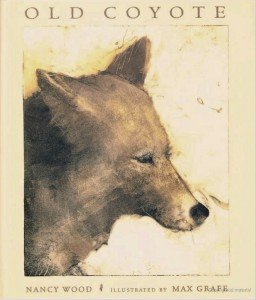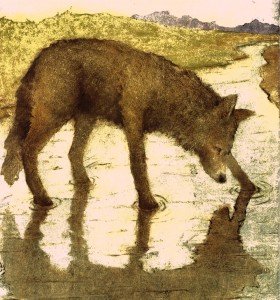Old Coyote had me with the cover, surely one of the most poignant, and beautifully observed illustrations of an animal I’ve ever seen. It’s in the eyes; heavy with sleep, closing in on one world, peaceful. They are like my 17 year old cat’s eyes, no longer round with anticipation, but tired and soft, resonant of a life lived, perhaps a life that is close to the end. I could not help but think of her as I read Old Coyote. Nevertheless, I’m pretty sure she would not appreciate being compared to an old dog. Not even a little bit.
Old Coyote came to me via my sister, briefly returned from a sabbatical in Arizona. She and her husband will be home for good in May, but she brought this book with her that weekend because she could not wait for me to read it. At 2:30 in the morning, sleep-deprived and messy of hair, sitting across the table from my jet-lagged sister, I read Old Coyote. The tears flowed with this line:
“I have grown old.”
It’s possible these heart-plucked words by Nancy Wood would fail to resonate if not for the plaintive illustrations of the coyote, and maybe the lateness of the hour, but no, I cried when I read it in the bright sunshine the following morning, and again at lunch today. Old Coyote’s last days are slow, and meaningful. An encounter with rabbits no longer excites his hunter’s instincts but instead elicits his empathy. He thanks the sun for the warmth, and the saguaro cacti for shade. The desert-infused illustrations have an unusual textural quality, as if the chalky surface has been scraped down to reveal the elemental components of the coyote’s long life. A particularly moving illustration shows Old Coyote and his ‘wife’ muzzle to muzzle as they reminisce about their lives together, and their ‘one-hundred and twenty-nine grandchildren.’ Evidently, the coyote was a lively fellow in his youth.
As the end approaches, Old Coyote follows the moon to a clearing in the forest where his friends have gathered. Farewells are spoken, and Old Coyote makes a final climb to the top of a mountain. Though tired, he is intensely aware of the world around him: the ‘cold-lipped wind’ pushing him along, the ‘soft noise that birds make when they’re going to sleep’, the humming insects. Old Coyote slips into a dream, and then his blue star-filled soul leaps out of his body into the undiscovered country of  death. It is quietly reverent, and stunningly beautiful.
death. It is quietly reverent, and stunningly beautiful.
I’m not crazy about children’s books that favour didacticism over storytelling (ie., anything written by a celebrity), where the reader is served a heavy-handed moral that is often accompanied by bad, or broadly interpreted illustrations. Certainly, books about death are a tough sell, and subtlety is almost always a casualty when the grim reaper shows up. And yet, with a perfect balance of sentiment and narrative, and the lush paintings by Max Grafe, Old Coyote manages to transcend other books of its type, delivering an honestly moving story about the passing of a life. I am reminded of City Dog, Country Frog, another book that tackles tough subject matter with deft storytelling and exquisite illustration. One book that I haven’t read yet, but is on my list is Duck, Death and the Tulip by Wolf Erlbruch. The review at Playing By the Book suggests a brilliant,  though perhaps more visually disturbing take on the final passage. Whatever the theme, a picture book succeeds or fails based on the quality of the writing and illustration, and its ability to engage the reader. Old Coyote is a sad book, but rarely has death been expressed so gently, and so beautifully.
though perhaps more visually disturbing take on the final passage. Whatever the theme, a picture book succeeds or fails based on the quality of the writing and illustration, and its ability to engage the reader. Old Coyote is a sad book, but rarely has death been expressed so gently, and so beautifully.
Max Grafe grew up in New Orleans and now lives in New York City, where he works as a printmaker, painter, and illustrator. He says of Old Coyote, “My goal for the images was to capture the essence of the words while leaving enough room for the viewer’s imagination to roam.”
Nancy Wood is an award-winning poet, novelist, photographer, and children’s book author. She says that “the idea behind Old Coyote comes from a universal belief about the endless circle of life.”
Old Coyote by Nancy Wood, illustrations by Max Grafe. Candlewick Press, 2004



For some reason, reading the review reminded me of ‘The Sad Book’ by Michael Rosen. I am not sure if there are any similarities – but, one of those books that grabs your heart and seemingly tries to squeeze it!